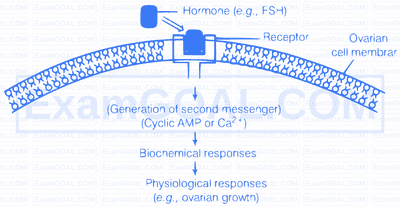The hormones that are derivatives of amino acids, polypeptides or proteins are called peptide hormones. These being insoluble in lipids can not enter the target cell.
These act at the surface of target cell as primary messengers and bind to the cell-surface receptor forming the hormone-receptor complex.
It involves following steps
(i) Hormone called first messenger attaches to the cell surface receptor protein on the outer surface of plasma membrane of the target cell, forming a hormone-receptor complex.
(ii) This complex activates the enzyme adenyl cyclase.
(iii) Adenyl cyclase catalyses the conversion of ATP to cyclic AMP on the inner surface of plasma membrane.
(iv) cAMP serves as the second messenger or intracelluar hormonal mediator delivering information inside the target cells. This activates appropriate cellular enzyme system by cascade effect. Which induces the cell machinery to perform its specialised function.
(v) cAMP has a very short existence. It is rapidly degraded by the cAMP phosphodiesterase. Water soluble hormones, such as amines, peptides, proteins and glycoproteins exert their control through the cyclic AMP. These are quick acting hormones and produce immediate effect.
State whether true or false
(a) Gastrointestinal tract, kidney and heart also produce hormones.
(b) Pars distalis produces six trophic hormones.
(c) B-lymphocytes provide cell-mediated immunity.
(d) Insulin resistance results in a disease called diabetes mellitus.
(a) Gastrointestinal tract, kidney and heart also produce hormones other than endocrine glands hence, the statement is True. Gl tract secretes hormones such as gastrin, secretin, cholecysto kienin etc., Kidney secretes renin and erythropectin. Heart secretes anti-natriuretic factor
(b) Pars distalis produces six trophic hormones, i.e., Growth Hormone (GH) Prolactin (PRL), Thyroid Stimulating Hormone (TSH), Adrinocortico Trophic Hormone (ACTH), Luteinising Hormone (LH) and Follicle Stimulating Hormone (FSH) hence, the statement is True.
(c) T-lymphocytes are involved in providing cell-mediated immunity not B-lymphocytes hence, the statement is False.
(d) The Insulin Dependent Diabetes Mellitus (IDDM) is caused by the failure of beta cells to produce adequate amount of insulin hence, results in a disease called diabetes mellitus. So, the statement is True.

Correct the following statements by replacing the term underlined.
(a) Insulin is a steroid hormone.
(b) TSH is secreted from the corpus luteum.
(c) Tetraiodothyronine is an emergency hormone.
(d) The pineal gland is located on the anterior part of the kidney.
(a) Insulin is a peptide hormone
(b) TSH is secreted from the pars distalis region of pituitary.
(c) Adrenaline is an emergency hormone.
(d) The adrenal gland is located on the anterior part of the kidney.